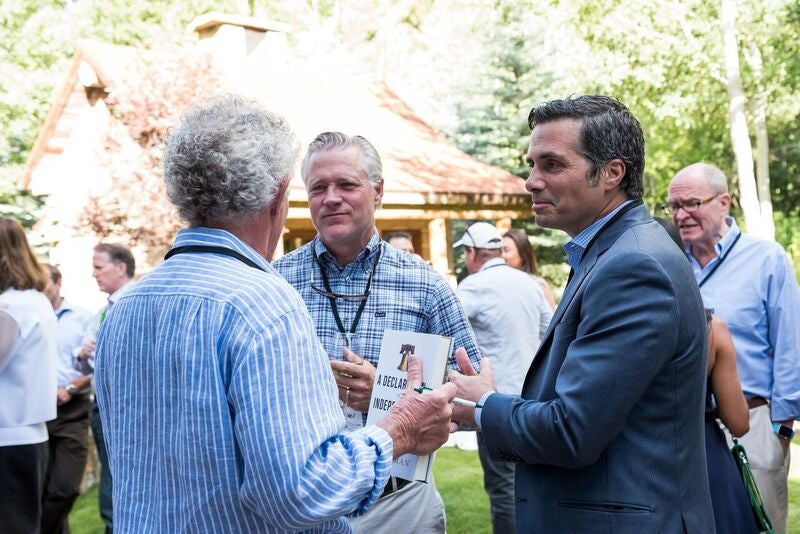“I think we are facing a conflict in politics today,” said Greg Orman, businessman, politician, and author, during an interview at a July Society of Fellows Vanguard Reception while discussing an issue that the whole country is grappling with: disillusionment with the American two-party political system.

Greg Orman, far right, discusses the two-party system with Society of Fellows members. (Photo credit: C2 Photography/The Aspen Institute.)
Orman ran as an independent candidate for Kansas Senate in 2014. His logic? Winning an election to United States Senate as the first non-Republican in the state of Kansas since 1932 would send a clear message to Washington: something is not working, and if Democrats and Republicans don’t shape up, someone else will swoop in and enact positive change.
Orman did not win the election, but he has not given up, even though the system is stacked against him. He knows well what his interviewer, Society of Fellows Director Peter Waanders reminded him of; “The system is designed to push out anyone who is not part of one of the two parties.”
Orman’s desire to sabotage what he calls the duopoly stems from his intent to infuse more efficiency, integrity, and accountability into Washington. When it comes to action steps, Orman speaks for creating higher functioning Democrats and Republicans—not exterminating them.
“When I told my dad that I wanted to go into politics, he quipped, ‘Well why don’t you skip the internship and go straight into crime!’”
Orman’s response today is, “It’s not public service if you can say it’s the best job you’re ever going to get.”
Although political parties should, in theory, be accountable to all constituents, they are also expected to reward and cater to a variety of special interests. Expanding the Independent voice in the United States Senate would send Orman’s message straight to Washington: “You can’t hide behind your party label; you’re here to get stuff done!”
“I still go to the ballot box and see only two options,” Waanders reminded Orman, who said that change is necessary. We can reduce the odds of two bad options by expanding the number of choices, Orman said.
“We’re getting the choice between the shingles and the flu, and we don’t want either,” he said. “If Republicans start losing in districts where Republicans are supposed to win, and Democrats start losing in districts where Democrats are expected to win, I think we are going to start to see a change of behavior in Washington. People in Washington are recognizing our political dysfunction.”
Orman is often accused of being a closet Democrat or closet Republican. In reality, he says, he is positioned to see both sides of the aisle, and not just walk across it. He grew up in a home with a liberal mother and a very conservative father. Theirs was not a house divided, but rather a house on broad, firm foundation. While his mother served as a union nurse and spoke of gender equality, his father ran his own business.
“Being an Independent was natural for me; it was the only way to navigate the world I grew up in!” Orman joked.
Orman remarked that in this age of polarized politics, people seem more concerned with their children marrying someone from a different political party than from a different race. “Partisanship has become the new prejudice,” Orman lamented.
But these words defy a deeper reality: the reality of people, like Orman, raised within multiparty homes, and others craving moderation and an end to gridlock. After all, many Americans only vaguely identify as a Democrat or Republican. In fact, Orman asserts, “Forty-two percent of Americans self-identify as politically independent. I think voters are trying to say, “We want something different.”
Greg Orman spoke at a Vanguard Reception for the Society of Fellows, a community of Aspen Institute supporters who actively participate in the Aspen Institute’s programs, act as advocates and ambassadors, and help sustain the Institute’s mission.

